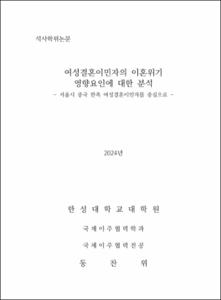여성결혼이민자의 이혼위기 영향요인에 대한 분석
= Analysis of Factors Influencing the Divorce Trend of Female Marriage Immigrants: Focused on Chinese female marriage immigrants
- Type
- Thesis
- Alternative Title
- 서울시 중국 한족 여성결혼이민자를 중심으로
- Advisor
- 김혜련
- Department
- 대학원 국제이주협력학과
- Issued Date
- 2024
- Publisher
- 한성대학교 대학원
- Files in This Item:
-
-
Download
 200000725189.pdf
기타 데이터 / 1.34 MB / Adobe PDF
200000725189.pdf
기타 데이터 / 1.34 MB / Adobe PDF
-
Items in Repository are protected by copyright, with all rights reserved, unless otherwise indicated.